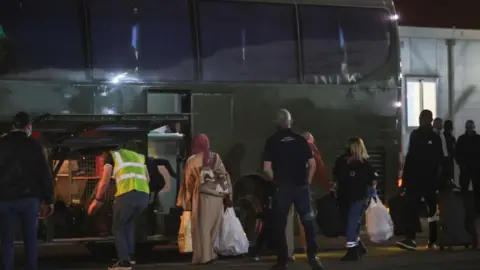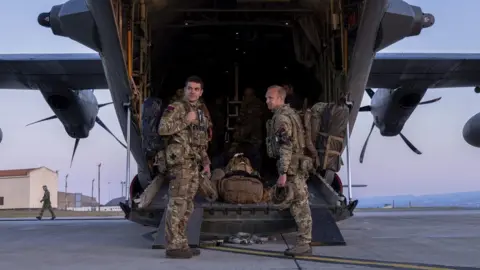Sudan: First evacuation flight of UK nationals lands in Cyprus
 Reuters
ReutersThe UK's first evacuation flight carrying British nationals from Sudan has landed in Cyprus.
More flights are expected tonight and on Wednesday, as the military attempts to get hundreds out of the war-torn country during a 72-hour ceasefire.
The BBC has been told that 39 people were on board the first plane, with 260 in total expected to arrive tonight.
Trapped UK nationals have been told to make their own way to an airport near Khartoum, without an escort.
Families with children, the elderly and people with medical conditions are being prioritised on RAF planes leaving from an airfield near the capital Khartoum, the government said.
Among the people on board the first evacuation flight were babies and people over 70.
People landing at Larnaca International Airport in Cyprus will later be transported back to the UK.
UK ministers have come under increasing pressure to help its citizens flee the fierce fighting, but it is unclear how many will be reached.
About 4,000 UK nationals are thought to be in Sudan and 2,000 of them have already requested help, Foreign Office minister Andrew Mitchell said on Monday, but the number who arrive at the evacuation point is expected to be lower.
Hundreds of people have been airlifted from Sudan by other countries, including more than 1,000 people by European Union nations.
Germany was due to end its evacuation on Tuesday evening after airlifting around 500 people on six flights.
UK defence secretary Ben Wallace told Channel 4 news "we can take, really, who turns up at the moment" - adding "there is some risk that some of the planes are not full".
A UK source told the BBC on Tuesday afternoon that communications with nationals in Sudan were "working okay" and people were managing to get to the airbase.
Only British passport holders and their immediate family with existing UK entry clearance are eligible, the government has said.
The Foreign Office initially said people should not travel to the evacuation site until told to do so - but updated its advice on Tuesday afternoon urging people to make their own way to the Wadi Saeedna airfield to the north of Khartoum "as soon as possible".
The advice published online warned evacuees that "travel within Sudan is conducted at your own risk and plans may change depending on the security situation".
Mr Wallace told a Commons committee earlier on Tuesday that 120 British troops were involved.
He also confirmed that Royal Marines were continuing to prepare an alternative route out of Sudan via a port on the east coast, as well as making contingencies for any humanitarian response.
The BBC understands the military is working on the assumption they have a 24-hour window in which to get planes in and out of Sudan, a window Prime Minister Rishi Sunak described as "absolutely critical".
A temporary pause in the fighting which has engulfed Sudan's capital appears to be holding, although there have been reports of new gunfire and shelling, and previous agreements have broken down.
At least 459 people have been killed since clashes between rival military factions began on 15 April, but the true number is thought to be much higher.
Foreign Secretary James Cleverly said the government was not able to escort people to the airfield and British nationals would need to "make their own way there".
Later on Tuesday, he said the situation remained "dangerous, volatile and unpredictable", and that the viability of the operation depended on those involved in the fighting.
Addressing Foreign Office staff working on the evacuation, Mr Suank said a "big push" was needed to "get everyone who wants to come home home".
One man with dual nationality said he feared he might not make it out of Sudan.
Musaab, who is waiting to be evacuated from Khartoum, told the BBC the situation was fraught with challenges.
"The one thing that I didn't like is that they're asking people to come to the airport - which is very risky because there is no law and order," he said.
Many British nationals have spent days indoors with food and drink running low and no electricity or wifi.
Several have spoken of their anger and desperation at being left behind, while other foreign nationals and UK embassy staff were flown out.
Sir Nicholas Kay, a former UK ambassador to Sudan, said the situation in Khartoum was precarious and the security situation could change rapidly because there was no trust between the two sides in the conflict.
 PA Media
PA MediaDr Nala Hamza, whose family is trying to get out of Khartoum, said the evacuation was "good news if it came to reality".
She said her family, who live in the centre of the city, had fled their home at dawn to try to get a bus to the north of the country.
"They were hiding in a room at the back of the house away from windows because of the shooting," she told BBC Breakfast.
Dr Hamza said at least 40 out of 55 hospitals were "not functioning at all" and the system "was already struggling before the war".
There was no safe route to get any help and doctors were exhausted, she added.
Mo, from Reading, said he was "very scared" for his family, who had arrived in Khartoum the day before the violence broke out.
"They were in that area for the first five days, with no electricity, water running out, they were isolated," he said.
"Even getting to this airport that's being looked at to be evacuating Brits from, that in itself is going to be hard to get to."

Are you a British citizen in Sudan? Please share your experiences if it is safe to do so by emailing [email protected].
Please include a contact number if you are willing to speak to a BBC journalist. You can also get in touch in the following ways:
- WhatsApp: +44 7756 165803
- Tweet: @BBC_HaveYourSay
- Upload pictures or video
- Please read our terms & conditions and privacy policy
If you are reading this page and can't see the form you will need to visit the mobile version of the BBC website to submit your question or comment or you can email us at [email protected]. Please include your name, age and location with any submission.
